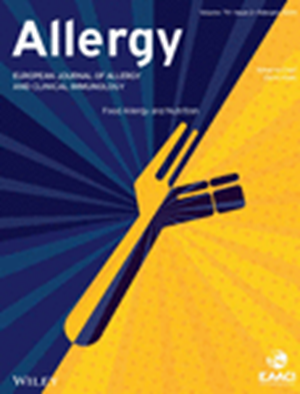Effect of the Multi‐Strain Probiotic SYN‐53 in the Management of Allergic Rhinoconjunctivitis
IF 12.6
1区 医学
Q1 ALLERGY
引用次数: 0
Abstract
Dysbiosis is increasingly linked to allergy development. This study evaluates the efficacy of the multi‐strain probiotic SYN‐53 in the management of allergic rhinoconjunctivitis (ARC). Eighty‐four subjects with confirmed grass pollen allergy underwent up to three bi‐weekly 3‐day intake cycles with SYN‐53 or placebo. After each cycle, subjects were exposed to grass pollen in an allergen exposure chamber. ARC symptoms were assessed using the Total Symptom Score (TSS) before and after each use of SYN‐53. After one intake cycle, SYN‐53 already showed a trend towards greater efficacy over placebo, which became significant after two cycles (ΔTSS多菌种益生菌SYN - 53在变应性鼻结膜炎治疗中的作用
生态失调与过敏的关系越来越密切。本研究评估了多菌株益生菌SYN - 53在变应性鼻结膜炎(ARC)治疗中的疗效。84名确诊对草花粉过敏的受试者接受了SYN - 53或安慰剂的三次双周3天的摄入周期。每个周期后,受试者在过敏原暴露室中暴露于草花粉。在每次使用SYN‐53前后使用总症状评分(TSS)评估ARC症状。在一个摄入周期后,SYN‐53已经显示出比安慰剂更有效的趋势,在两个周期后变得显著(ΔTSSMAX:−3.44±0.42 vs−1.87±0.37;P = 0.0067),症状缓解38% vs. 24%。在有中度至重度症状的受试者中,SYN‐53在单次摄入周期后已经显著优于对照组,并在两个周期后进一步改善(ΔTSSMAX:−4.78±0.51 vs.−2.43±0.47;P = 0.0014),症状缓解45% vs 26%。SYN‐53在ARC的管理中是有效的,强调了益生菌营养补充剂中细菌多样性和剂量的作用。
本文章由计算机程序翻译,如有差异,请以英文原文为准。
求助全文
约1分钟内获得全文
求助全文
来源期刊

Allergy
医学-过敏
CiteScore
26.10
自引率
9.70%
发文量
393
审稿时长
2 months
期刊介绍:
Allergy is an international and multidisciplinary journal that aims to advance, impact, and communicate all aspects of the discipline of Allergy/Immunology. It publishes original articles, reviews, position papers, guidelines, editorials, news and commentaries, letters to the editors, and correspondences. The journal accepts articles based on their scientific merit and quality.
Allergy seeks to maintain contact between basic and clinical Allergy/Immunology and encourages contributions from contributors and readers from all countries. In addition to its publication, Allergy also provides abstracting and indexing information. Some of the databases that include Allergy abstracts are Abstracts on Hygiene & Communicable Disease, Academic Search Alumni Edition, AgBiotech News & Information, AGRICOLA Database, Biological Abstracts, PubMed Dietary Supplement Subset, and Global Health, among others.
 求助内容:
求助内容: 应助结果提醒方式:
应助结果提醒方式:


